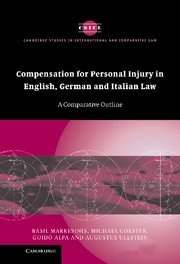Book contents
- Frontmatter
- Contents
- Foreword
- Preface
- Table of cases
- List of Abbreviations
- 1 Introduction
- 2 General damages: non-pecuniary losses
- 3 Special damages: past losses
- 4 Future pecuniary losses
- 5 Collateral sources of revenue: subrogation rights and miscellaneous matters
- 6 Conclusions
- Appendix: Comparative tables on the evaluation of physical injury (IP) for micro-permanent injuries
- Index
- CAMBRIDGE STUDIES IN INTERNATIONAL AND COMPARATIVE LAW
Foreword
Published online by Cambridge University Press: 02 July 2009
- Frontmatter
- Contents
- Foreword
- Preface
- Table of cases
- List of Abbreviations
- 1 Introduction
- 2 General damages: non-pecuniary losses
- 3 Special damages: past losses
- 4 Future pecuniary losses
- 5 Collateral sources of revenue: subrogation rights and miscellaneous matters
- 6 Conclusions
- Appendix: Comparative tables on the evaluation of physical injury (IP) for micro-permanent injuries
- Index
- CAMBRIDGE STUDIES IN INTERNATIONAL AND COMPARATIVE LAW
Summary
In 1871, when reviewing Addison's recently published The Law of Torts, Oliver Wendell Holmes expressed the view that ‘Torts is not a proper subject for a law book’ ((1871) 5 Am.LR 340). In 1881 Holmes gave the lie to this idea in his famous book The Common Law which contained a magisterial chapter on the theory of the law of torts. Today, tort law has a strong claim to have generated more case law and more literature than any other branch of the law.
In an age in which comparative law has come of age the development of our tort law has benefited greatly from comparative methods. It has enabled us to test our law against feasible solutions adopted in foreign legal systems. Due perhaps in large measure to the relative inaccessibility of sources in foreign languages, the comparative exercise has unfortunately in English legal practice largely concentrated on decisions in common law jurisdictions, such as Australia, Canada, New Zealand and South Africa. That our courts need not be so inhibited has been underlined, for example, by three major works, i.e. Prof. Christian von Bar, The Common European Law of Torts, vols. 1 and 2 (2000); Prof. Walter van Gerven (van Gerven, Lever and Larouche), Cases, Materials and Text on National, Supranational and International Tort Law (2000); Prof. Basil Markesinis and Prof. Hannes Unberath, The German Law of Torts (4th edn, 2002). All three are, of course, essential reading for practitioners.
- Type
- Chapter
- Information
- Compensation for Personal Injury in English, German and Italian LawA Comparative Outline, pp. xiii - xivPublisher: Cambridge University PressPrint publication year: 2005



